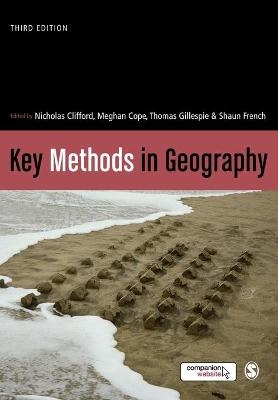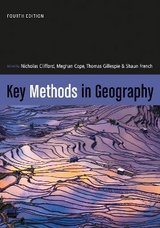
Key Methods in Geography
SAGE Publications Ltd (Verlag)
978-1-4462-9860-2 (ISBN)
- Titel gebraucht verfügbar
- Artikel merken
"Practical, accessible, careful and interesting, this...revised volume brings the subject up-to-date and explains, in bite sized chunks, the ′how′s′ and ′why′s′ of modern day geographical study...[It] brings together physical and human approaches again in a new synthesis." —Danny Dorling, Professor of Geography, University of Oxford
Key Methods in Geography is the perfect introductory companion, providing an overview of qualitative and quantitative methods for human and physical geography.
This Third Edition Features:
12 new chapters representing emerging themes including online, virtual and digital geographical methods
Real-life case study examples
Summaries and exercises for each chapter
Free online access to full text of Progress in Human Geography and Progress in Physical Geography Progress Reports
The teaching of research methods is integral to all geography courses: Key Methods in Geography, Third Edition explains all of the key methods with which geography undergraduates must be conversant.
Nick Clifford is Professor and Head of Department at King’s College London. Dr. Meghan Cope is an urban social geographer. She is mainly interested in the ways that social, economic, political, and environmental processes influence cities and communities, as well as the ways that people′s everyday lives create meaningful spaces and places within, or even against, the larger-scale processes operating on them. Her focus has always been on social/spatial processes of marginalization and disempowerment, for example, through gender, race/ethnicity, class, youth, etc. She is especially motivated by issues such as employment, households and neighborhoods, welfare, public space, poverty, discrimination, and identity. She is also a qualitative researcher who uses ethnography and other methods to learn about the geographic meanings and processes that matter to marginalized groups. Over the past 10 years she has developed an associated interest in critical perspectives on Geographic Information Systems (GIS) and have explored methods of combining qualitative research with GIS (Cope & Elwood, 2009). Thomas Gillespie teaches geography at UCLA. Shaun French is Associate Professor in Economic Geography at the University of Nottingham.
SECTION ONE: PLANNING A RESEARCH PROJECT: GETTING STARTED AND PUTTING YOUR RESEARCH INTO CONTEXT
Getting Started in Geographical Research: how this book can help - Nicholas Clifford, Shaun French, Meghan Cope and Thomas Gillespie
Health, Safety and Risk in the Field - Joanna Bullard
On Being Ethical in Geographical Research - Iain Hay
How to Conduct a Literature Search - Mick Healey and Ruth L. Healey
Effective Research Communication - Jennifer Hill and Helen Walkington
Working in different cultures and different languages - Fiona Smith
SECTION TWO: GENERATING AND WORKING WITH DATA IN HUMAN GEOGRAPHY
Historical and Archival Research - Ruth Craggs
Conducting questionaire surveys - Sara L. McLafferty
Semi-structured interview and focus groups - Robyn Longhurst
Respondent Diaries - Alan Latham
Participant and non-participant observation - Eric Laurier
Researching Affect and Emotion - Ben Anderson
Participatory Action Research - Myrna Breitbart
Textual Analysis - Marcus Doel
Interpreting the Visual - Liz Roberts
Using Geotagged Digital Social Data in Geographic Research - Ate Poorthuis, Matthew Zook, Taylor Shelton, Mark Graham & Monica Stephens
Researching Virtual Communities - Mike Crang & Siti Haji Bin Mohamed
Critical GIS - Matthew W. Wilson
Quantitative modelling in human geography - Alan Marshall
SECTION THREE: GENERATING AND WORKING WITH DATA IN PHYSICAL AND ENVIRONMENTAL GEOGRAPHY
Making Observations and Measurements in the Field - Shelly A. Rayback
Making Observations and Measurements in the Laboratory - Scott A. Mensing
Getting information from the past: Paleoecological studies of terrestrial ecosystems - Laura N. Stahle and Cathy Whitlock
Numerical modelling: Understanding explanation and prediction in physical geography - Stuart Lane
Simulation and reduced complexity models - James D. A. Millington
Remote Sensing and Satellite Earth Observation - Martin Wooster, Nicholas Drake & Tom Smith
Digital Terrain Analysis - Peter L. Guth
Environmental GIS - Thomas Gillespie
Models and Data in Biogeography and Landscape Ecology - George P. Malanson and Benjamin W. Heumann
Environmental audit, appraisal and valuation - Peter Glaves
SECTION FOUR: GEOGRAPHICAL ANALYSIS: REPRESENTING, VISUALISING AND INTERPRETING GEOGRAPHICAL DATA
Making use of secondary data - Naomi Tyrrell
Using Statistics to Describe and Explore Spatial Data - Eric Delmelle
Exploring and presenting quantitative data - Richard Field
Case Study Methodology - Liz Taylor
Mapping and Graphicacy - Chris Perkins
Statistical analysis using MINITAB and SPSS - Stuart Barr
Organizing, Coding and Analyzing Qualitative Data - Meghan Cope & Hilda Kurtz
Using Geographical Information Systems (GIS) - Nigel Walford
Video, Audio & Technology-based Applications - Brad Garrett
| Verlagsort | London |
|---|---|
| Sprache | englisch |
| Maße | 170 x 242 mm |
| Gewicht | 1370 g |
| Themenwelt | Naturwissenschaften ► Geowissenschaften ► Geografie / Kartografie |
| ISBN-10 | 1-4462-9860-4 / 1446298604 |
| ISBN-13 | 978-1-4462-9860-2 / 9781446298602 |
| Zustand | Neuware |
| Informationen gemäß Produktsicherheitsverordnung (GPSR) | |
| Haben Sie eine Frage zum Produkt? |
aus dem Bereich




